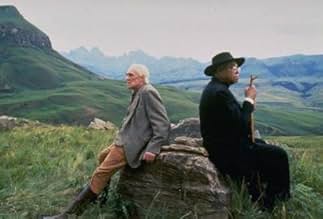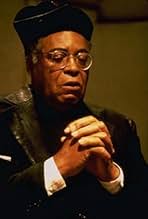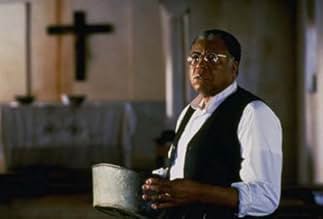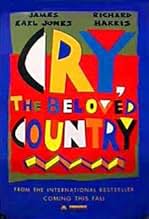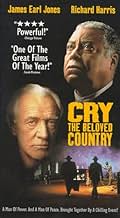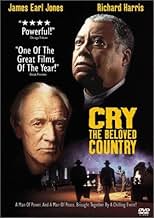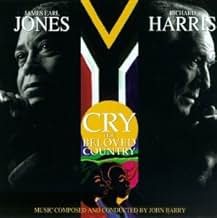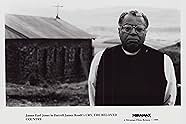IMDb RATING
6.8/10
2.2K
YOUR RATING
A South African preacher goes to search for his wayward son, who has committed a crime in the big city.A South African preacher goes to search for his wayward son, who has committed a crime in the big city.A South African preacher goes to search for his wayward son, who has committed a crime in the big city.
- Awards
- 1 win & 4 nominations total
Themsie Times
- Shebeen Queen
- (as Tembsie Times)
- Director
- Writers
- All cast & crew
- Production, box office & more at IMDbPro
Featured reviews
I know most readers won't find my comments useful, but here goes anyway. I saw this movie a long long time ago but recently went looking for it on IMDb (not sure why), probably to look up snippets about Richard Harris. What I remember most about the movie was 1) the incredible cinematography - no denying that African countryside is gorgeous, and 2) the one long extended scene between James Earl Jones and Richard Harris. I don't even remember most of the dialogue, only that these two great classically-trained actors almost literally chewed the scenery. I remember that the scene was calmly played, yet both actors simmered with just-perceptible passion.
I once performed in the Kurt Weill opera of the same name. I'm accustomed to having music propel me through the story, but I didn't miss it in this movie. One casting note - probably because of recent trends in NTC (non-traditional casting), most stage shows refer to the racial divide in the opera as "whites" and "coloreds," which, under apartheid, included all non-whites. Whether or not this was intentionally done by the librettist, it gives opera companies the freedom to hire Asian-Americans, African-Americans, and Hispanic-Americans (or Europeans) as the "colored" cast. In the movie, it was starkly white and black. Nevertheless, if you lack any other reason for seeing the movie, see it for the wonderful performances of Jones and Harris.
I once performed in the Kurt Weill opera of the same name. I'm accustomed to having music propel me through the story, but I didn't miss it in this movie. One casting note - probably because of recent trends in NTC (non-traditional casting), most stage shows refer to the racial divide in the opera as "whites" and "coloreds," which, under apartheid, included all non-whites. Whether or not this was intentionally done by the librettist, it gives opera companies the freedom to hire Asian-Americans, African-Americans, and Hispanic-Americans (or Europeans) as the "colored" cast. In the movie, it was starkly white and black. Nevertheless, if you lack any other reason for seeing the movie, see it for the wonderful performances of Jones and Harris.
Apartheid was a grotesque social experiment aimed at perpetuating the evils of colonialism after the age of empires was past; white liberal Alan Paton one of its most celebrated literary critics. Darrell Roodt's film of perhaps his most famous book, Cry, the Beloved Country', stars Richard Harris and James Earl Jones (better known as the voice of Darth Vader, which leads to some unintentionally comic moments) and is not an awful film; but politically, it misses its targets. Aided by some slushy background music, it invests most of its black characters with a frankly ludicrous level of dignity; while oddly underplaying its depiction of the routine dehumanisation that black people suffered under white rule. In consequence, the film's only real anger appears directed not at the system but at Jones's brother, a nasty and opportunist anti-apartheid campaigner, which was surely not quite the original point. At the end of the film, an impassioned quote from Paton appears on the screen; it's a shame it seems so unconnected with what has preceded it.
It's been a long time since I read the Alan Paton book upon which this film is based. Paton was banned in his own country and officially silenced but the book was universally popular throughout the 1960s.
James Earl Jones once again renders a bravura performance as the African minister whose son has accidentally killed a white man. One can feel his grief and his burden as he tries to straighten the mess out. His son has confessed but others involved have denied knowledge of the offense.
Richard Harris plays an equally difficult role that of Mr Jarvis the white boy's father. One feels his grief and pain especially when he finds to his surprise that his son had disowned "baaskap," the over-lordship of the white race, something accepted as a given by most whites without a second thought just as the white housewife perfunctorily dismissed the black cleric in priestly garb as if he were a pesty door to door salesman.
Will mercy be extended to the preacher's son who accidentally pulled the trigger and cooperated with authorities or will he suffer the ultimate penalty while accomplices go free? Yet for all the misery the movie, surprisingly without excessive preaching, ends on a flicker of hope for the future.
James Earl Jones once again renders a bravura performance as the African minister whose son has accidentally killed a white man. One can feel his grief and his burden as he tries to straighten the mess out. His son has confessed but others involved have denied knowledge of the offense.
Richard Harris plays an equally difficult role that of Mr Jarvis the white boy's father. One feels his grief and pain especially when he finds to his surprise that his son had disowned "baaskap," the over-lordship of the white race, something accepted as a given by most whites without a second thought just as the white housewife perfunctorily dismissed the black cleric in priestly garb as if he were a pesty door to door salesman.
Will mercy be extended to the preacher's son who accidentally pulled the trigger and cooperated with authorities or will he suffer the ultimate penalty while accomplices go free? Yet for all the misery the movie, surprisingly without excessive preaching, ends on a flicker of hope for the future.
10rondine
I could not believe as I read other reviewers of this movie that they thought it "irrelevant"! The struggle for equality, peace and love is NEVER irrelevant. This was a movie that by any standards is brillant and moving. James Earl Jones does a magnificent job of playing the main character with dignity and restraint. He makes you suffer with him as a result. A drama coach I once had told me, don't you cry, let them cry. He does both through his amazing minimalist acting. He doesn't waste himself on meaningless gestures & histronics, he lets you see the suffering of his soul. Equally brillant is Richard Harris as the father of the son killed by Jones' son. These two men are brought together in the worst of circumstances and that is when the true character of the man is revealed. Despite all his racist comments earlier in the movie, he overcomes his own self-hate (translated to Africans) to see the bigger picture that his own son knew all along. Someone once said, you cannot hate anything in someone else, unless it reflects something you hate within yourself. Through the pain & death of his son, he transcends his own sense of self-loathing. He sees with the eyes of love that people are just people, no matter what color their skin is. A movie that communicates that is never irrelevant or unimportant.
Rev Kumalo receives a letter from Johannesburg telling him that his sister, who went there many years ago to look for her husband, is very sick and that he should come immediately. When he arrives he is robbed but finds a home with the sender of the letter. His sister is working as a prostitute in a brothel in town and his quest to help her soon turns to finding his brother and then his own son. However events will bring the nature of the racial divide into full focus.
It has been many years since I read the book but I always remember it as it was quite thought provoking bringing in wider issues into the framework of the main story. I was surprised to find this version made by Disney and was prepared for almost a child's film, happily I was wrong. The plot is quite well developed in terms of the central story and, although I wasn't moved to the point of tears, I did find it pretty involving and moving to some degree. What it failed to do though was bring out wider issues from the period and setting. True it let us see the places and the divide but there was no subtext only visual images.
The direction is good whether it is the outdoors, a rain swept church or a small indoors room, it all has a good sense of place and time. The cast is all pretty good. Jones is the strongest and acts as the moral backbone of the story he is seeing these things for the first time just like we are as an audience. The late Richard Harris is also good but has less screen time. I think his character needed more as it is he who has the biggest journey of discovery where Kumalo's is physical, his is more into himself and learning to overcome his feelings. The South African cast are mainly very good and give good support the only real flaw was that I wasn't totally convinced that Kumalo's relatives were really his relatives only Dutton managed to bring out an emotional history and have a sort of bond with Jones, the rest were a little too distant.
Overall this is a good version of the book albeit with the focus more on the core narrative than other themes. The leads are good and it is an involving story. Not fantastic but a good drama about one man's strength.
It has been many years since I read the book but I always remember it as it was quite thought provoking bringing in wider issues into the framework of the main story. I was surprised to find this version made by Disney and was prepared for almost a child's film, happily I was wrong. The plot is quite well developed in terms of the central story and, although I wasn't moved to the point of tears, I did find it pretty involving and moving to some degree. What it failed to do though was bring out wider issues from the period and setting. True it let us see the places and the divide but there was no subtext only visual images.
The direction is good whether it is the outdoors, a rain swept church or a small indoors room, it all has a good sense of place and time. The cast is all pretty good. Jones is the strongest and acts as the moral backbone of the story he is seeing these things for the first time just like we are as an audience. The late Richard Harris is also good but has less screen time. I think his character needed more as it is he who has the biggest journey of discovery where Kumalo's is physical, his is more into himself and learning to overcome his feelings. The South African cast are mainly very good and give good support the only real flaw was that I wasn't totally convinced that Kumalo's relatives were really his relatives only Dutton managed to bring out an emotional history and have a sort of bond with Jones, the rest were a little too distant.
Overall this is a good version of the book albeit with the focus more on the core narrative than other themes. The leads are good and it is an involving story. Not fantastic but a good drama about one man's strength.
Did you know
- TriviaThe background instrumental music in the movie is the same as the theme song from the movie Zoulou (1964).
- Quotes
Rev Stephen Kumalo: My brother is greatly changed.
Theophilus Msimangu: But he has some truth on his side.
Rev Stephen Kumalo: "Truth"? But how can he have truth on his side and not God?
Theophilus Msimangu: At least he's got something. Look around. What do you see? Poverty, pain, suffering. Sometimes it is hard even for me to keep faith. Perhaps God is also on his side. Only your brother does not want to know it anymore.
- ConnectionsFeatured in 2nd Annual Screen Actors Guild Awards (1996)
- How long is Cry, the Beloved Country?Powered by Alexa
Details
Box office
- Gross US & Canada
- $670,727
- Gross worldwide
- $670,727
- Runtime1 hour 46 minutes
- Color
- Sound mix
- Aspect ratio
- 1.85 : 1
Contribute to this page
Suggest an edit or add missing content

Top Gap
By what name was Pleure ô pays bien-aimé (1995) officially released in India in English?
Answer

